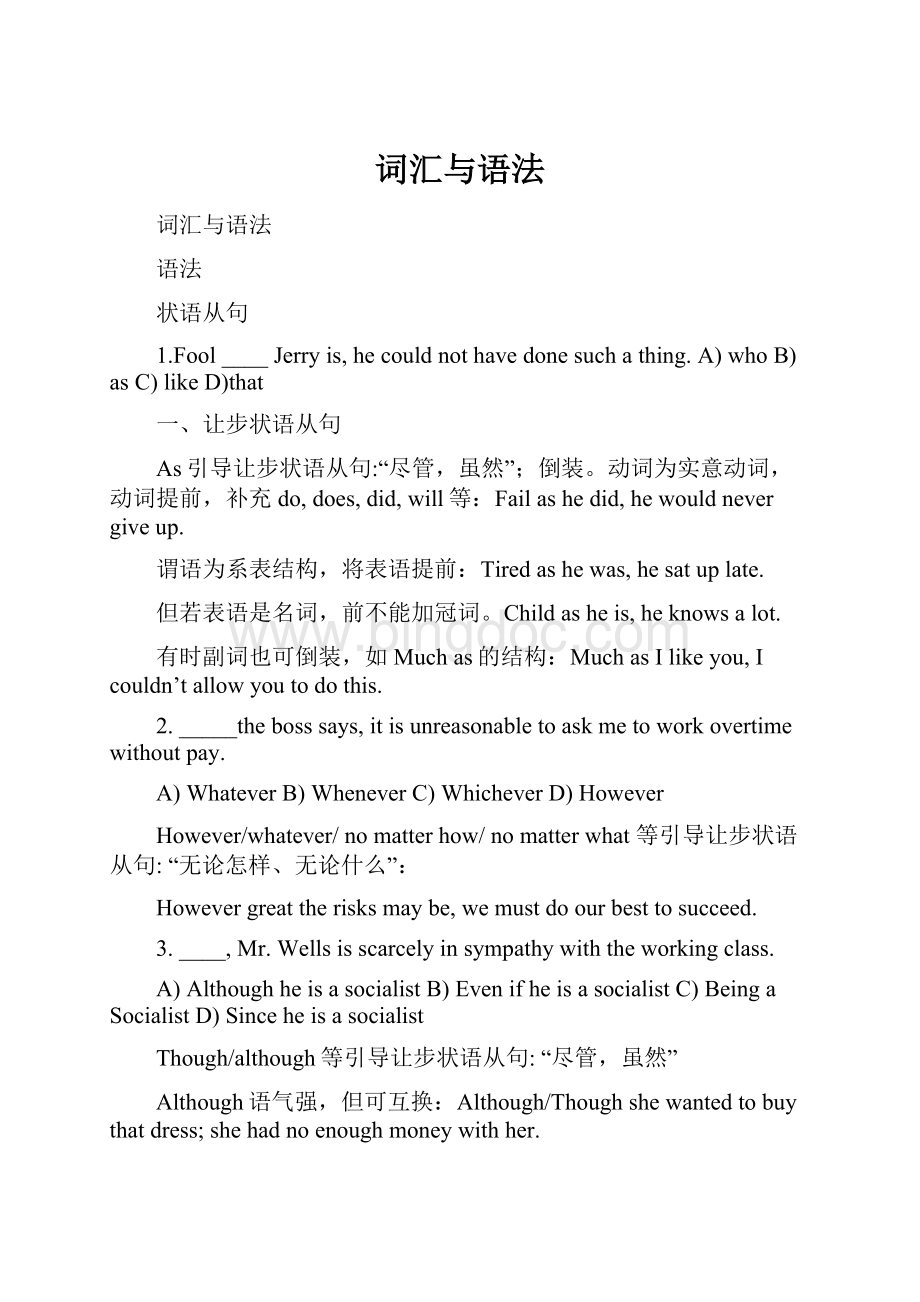词汇与语法.docx
《词汇与语法.docx》由会员分享,可在线阅读,更多相关《词汇与语法.docx(41页珍藏版)》请在冰点文库上搜索。

词汇与语法
词汇与语法
语法
状语从句
1.Fool____Jerryis,hecouldnothavedonesuchathing.A)whoB)asC)likeD)that
一、让步状语从句
As引导让步状语从句:
“尽管,虽然”;倒装。
动词为实意动词,动词提前,补充do,does,did,will等:
Failashedid,hewouldnevergiveup.
谓语为系表结构,将表语提前:
Tiredashewas,hesatuplate.
但若表语是名词,前不能加冠词。
Childasheis,heknowsalot.
有时副词也可倒装,如Muchas的结构:
MuchasIlikeyou,Icouldn’tallowyoutodothis.
2._____thebosssays,itisunreasonabletoaskmetoworkovertimewithoutpay.
A)WhateverB)WheneverC)WhicheverD)However
However/whatever/nomatterhow/nomatterwhat等引导让步状语从句:
“无论怎样、无论什么”:
Howevergreattherisksmaybe,wemustdoourbesttosucceed.
3.____,Mr.Wellsisscarcelyinsympathywiththeworkingclass.
A)AlthoughheisasocialistB)EvenifheisasocialistC)BeingaSocialistD)Sinceheisasocialist
Though/although等引导让步状语从句:
“尽管,虽然”
Although语气强,但可互换:
Although/Thoughshewantedtobuythatdress;shehadnoenoughmoneywithher.
Though可做并列连词,表but,yet,however。
例:
Heispoor,thoughheissatisfiedwithhiscondition.
也可作副词,放句末,表“但是,然而”,although没有这种用法:
Hesaidtowritetoher.Hedidn’t,though.
4._____Isympathize,Ican’treallydoverymuchtohelpthemoutofthedifficulties.
A)AslongasB)AsC)WhileD)Even
While引导让步状语从句:
意义同although,但强调主从句发生时间一致。
WhileIunderstandwhatyousay,Ican’tagreewithyou.
While引导的从句一般在主句前,如放后面,则表对比。
Mybrotherboughthiscamerafromafriend,whileIboughtminefromashop.
5.___,I’llmarryhimallthesame.
A)WasherichorpoorB)WhetherrichorpoorC)WereherichorpoorD)Beherichorpoor
Be的虚拟式让步
Be的原形位于句首,表虚拟。
意为‘无论,不管,虽然’,相当于whether…or:
例:
Behefriendorfoe,thelawregardshimasacriminal.
Beitverylate,Ihavetocontinuemyexperiment.
其他常见的引导让步状语从句的词语evenif/eventhough即使whether…or无论,不管,forall(that)尽管regardlessof(thefactthat)尽管regardlessofwhether不管是否inspiteof(thefactthat)尽管despite(thefactthat)尽管
二、时间状语从句
1.Ienjoyedmyselfsomuch____IvisitedmyfriendsinParislastyear.A)whenB)whichC)thatD)where
When,while,as引导时间状语从句时的区别:
When用法作广泛,可表一个时间或时间段的动作或状态,也可表持续的动作或状态;可表主从句动作同时发生,也可表从句动作先于主句动作:
Whenwelivedintown,weoftenwenttothetheatre.
When也可表示“正当……时候”,通常在主句之后:
IwaswatchingTVwhensomeoneknockedthedoor.
While一般表持续性动作或状态,不能表一段时间内的动作或短暂的动作,它强调主从句动作的同时性,通常同时进行的动作持续时间较长:
I’lllookafteryourchildrenwhileyouareaway.
As表动作同时发生,经常用于表短暂性动作或渐进性动作,意为“随着”:
Asitgrewdarker,itbecamecolder.
2.Thecouplehadnosoonergottothestation____thecoachleft.A)whenB)asC)untilD)than
Hardly/scarcely/barely…when;nosooner…than:
刚一……就……
主句一般是过去完成时,从句一般过去时。
常倒装,即将Hardly/scarcely/barely或nosooner提前,主句倒装:
Hardly/Scarcely/BarelyhadIreachedthestationwhenthetrainstarted.=Ihadhardly/scarcely/barelyreachedthestationwhenthetrainstarted.
Nosoonerhassheheardthenewsthanshefainted.=Shehasnosoonerheardthenewsthanshefainted.
Since引导时间状语从句:
“自从”,从句多非延续性动词,主句一般完成时。
SinceheleftNanjinglastyear,Ihaven’theardfromhim.
Until/till引导实践状语从句
表主句动作或状态一直延续到……时间为止,此时主句为肯定句,位于一般是延续性动词;也可表主句动作到……时候才开始,此时主句是否定句,谓语可以是延续性也可以不是。
句首只能用Until,不能用till。
Hehasbeenwaitingatthebusstationuntil/tilltherainstops.
Untiltheaccidenthappenedhedidnotrealizedtheimportanceofsafedriving.
Themoment,theminute,theinstant等引导时间状语从句
Themoment,theminute,theinstant,theday,theyear,everytime,anytime,nexttime等引导,表主句紧跟从句动作发生:
I’lltellyouaboutitthemomentyoucome.
TheminuteIsawhimIknewthatsomethingbadhadhappened.
其他常见的时间状语从句引导词:
after,before,assoonas,once,whenever
Assoonashewentintotheroom,thephonerang.
Onceyoustarttoreadthatbook,youcouldnotputitdown.
Wheneveryoucome,youarewelcome.
三、方式状语从句
As引导,常位于主句后,意为“按照,依照,以……的方式”。
:
YououghttodoasItellyou.
但在“justas…so”结构中,as从句常放句首:
Justasfoodisnecessarytolife,soarebookstoourspirit.
3.Shedidherwork___hermanagerhadinstructed.A)asB)untilC)whenD)though
Asif/asthough引导:
“好像”,后接真实情况或虚拟情况:
Itlooksasifheisinlovewithher.
Hetalksasifhekneweverything.
(in)theway(that)引导:
in和that常省略:
Marycooksthemealthewayhermotherdoes.
四、原因状语从句
Because,since,as,for引导原因状语从句时的区别
Because常表直接、主要原因,多主句后,如前置,必须用逗号与主句分开。
Becausehewantsustomakerapidprogress,theteacherisstrictwithus.
回答why问句,只能由because回答。
强调句中强调原因状语时,只能用because引导,其他都不能。
Itwasbecausehewasillthathedidn’tcomeyesterday.
For表补充说明或推测的原因,只能用于主句后,并用逗号将主从句分开。
Idecidedtostopandhavelunch,forIhaddrivennearlyfourhours.
For引导的原因从句前不能用Not,but,just,only等否定或强调词修饰。
Hestole,notbecausehewantedthemoney,butbecausehelikedstealing.
Since和as常表明显的、已知的理由或原因,气候内容是确定的事实,常译为“既然”。
从句多用于主句前,但也可置后:
Since/ashewasnotathome,Ispoketohisbrother.
Wehadtowalkallthewaysince/aswehadnomoneyforfares.
As引导的原因状语从句还可倒装,即表、状+as+主语+谓语:
Tiredastheywere,theywenttobedassoonastheycameback.
注意:
as的倒装结构也表让步,注意区别。
4.Mendifferfromanimals___theycanthickandspeak.A)forwhichB)forthatC)inthatD)inwhich
其他常见的原因状语从句引导词:
inthat因为,在于,nowthat既然,seeing(that)鉴于,由于,considering(that)鉴于,由于,ontheground(s)that鉴于,由于,notthat…butthat…不是因为…而是因为inasmuchas/inasmuchas因为,byreasonthat因为,forthereasonthat因为,onaccountofthefactthat因为,owingtothefactthat因为inviewofthefactthat因为becauseofthefactthat因为duetothefactthat因为
五、条件状语从句
1.Heaskedmetolendhimsomemoney,whichIagreedtodo,___thathepaidmebackthefollowingweek.
A)onoccasionB)onpurposeC)onconditionD)onlyif
条件状语从句分为真实条件句和非真实条件句。
非真实将在后面的虚拟语气中讲到,这里将真实条件句。
条件状语从句的引导词有:
if,unless=ifnot,provided/providing(that),suppose/supposing(that),given(that),as/solongas,incase(that),onconditionthat,intheeventthat
注:
若表示对将来的假设,if条件句应用一般现在时代替将来时:
Ifitrainstomorrow,Iwillnotgoswimming.
有时if条件句的谓语还可用shoulddo的形式,表语气强的假设,should常提前构成倒装,省略if:
ShouldyourTVsethaveanyproblems,senditbacktome.
2.Ifyourcar___anyattentionduringthefirst12months,takeittoanauthorizeddealer.
A)shallneedB)shouldneedC)wouldneedD)willneed
六、结果状语从句
1.–DoesAlanlikehamburgers?
—Yes.Somuch___thatheeatsthemalmosteveryday.A)forB)asC)toD)so
Sothat引导
从句必须放在主句后,常用逗号分开,有时省略so或that:
TheTVsetarriveddamaged,sothatwehavetosenditback.
WhatIhavedone(so)thatyoushouldbesoangrywithme?
Suchthat也能引导结果状语从句,但such是代词:
Hisangerwassuchthathelostcontrolofhimself.
So…that,such…that引导
So修饰形容词或副词,such修饰名词,that可省略,但用逗号分开主从句:
HeransoquicklythatIcouldn’tcatchhim.
ThenoveliswritteninsuchsimpleEnglishthatwecanunderstanditwithoutdifficulties.
其他常见的结果状语从句引导词:
withtheresultthat,tothedegreethat,tosuchanextent/degreethat也可引导。
Hiscoatwasthoroughlywet,withtheresultthathehadtogohome.
Helaughedtothedegreethatitwasimpossibleformetohelplaughingtoo.
Thetemperatureloweredtosuchanextent/degreethatthewaterfroze.
七、目的状语从句:
Sothat,inorderthat,forfearthat,lest,incase
名词性从句
引导词有:
that,whether,if,who(ever),whom(ever),what(ever),which(ever),whose(连接代词在句中充当主语、宾语或定语),when,where,why,how(句中当状语)
同位语只能由that引导。
一、几个重要的名词性从句关系词的用法
引导词
含义和作用
例子
That
只引导,不充当句子成分,
没有实际意义。
ThetravelserviceagentexplainedthattherewereflightstoRomethatmorning.
What
在从句中充当主语或
宾语。
Whatseemseasytosomepeopleseemsdifficulttootherpeople.
Whatever/
Whoever
意为“无论什么、谁”,在从句中充当主语或宾语。
Whoeverbreaksthislawdeservesafinegift.
Whether/if
意为“是否”,不充当成分。
Whether常与or(not)连用,if不能。
Whetheritwilldousharmorgoodremainstobeseen.
1.After___seemedanendlesswait,itwashisturntoenterthepersonalmanager’soffice.
A)thatB)itC)whatD)there
2.Thereisnodoubt___thecompanyhasmadetherightdecisiononthesalesproject.
A)whyB)thatC)whetherD)when
二、从句的语序和时态
名词性从句一般用陈述语序,主从句时态保持一致,esp宾语从句:
Johnexclaimedwithdelightthatshewouldsimplylovetogo.
但有时主从句时态也不一致:
Theteachertoldustodaythatthemoonmovesroundtheearth.
3.Iamsurprised___thiscityisadullplacetolivein.
A)thatyoushouldthinkB)bywhatyouarethinkingC)thatyouwouldthinkD)withwhatyouwerethinking
三、形式主语it
为保持句子平衡,it会做句子主语,或代替宾语从句充当形式宾语,而将主语从句或宾语从句放到句尾。
ItisnobusinessofyourswhatIhavedonetoher.
Wethinkithighlyprobablethathewillresign.
4.Weconsider___heshouldhaveleftwithouttellinganyonebeforehand.
A)strangewhyB)itstrangeC)itstrangethatD)thatstrange
四、固定句式:
AistoBwhatCistoD
5.Nineistothree___threeistoone.A)whenB)thatC)whichD)what
“A之于B就像C之于D一样”。
What引导表从:
Enginesaretomachineswhatheartsaretoanimals.
定语从句
分限定性和非限定性。
限定性从句不能省,非可以,因为非限定性从知识补充说明。
Themanwhodidtherobberyyesterdayhasbeencaught.
Themandidtherobberyyesterday,whohasbeencaught.
一、引导词有:
关系代词:
that,which,who/whom,whose,(在从句中做主语、宾语或定语)
When,where,why(状语),which,who/whom,whose,as(主、宾、定)
关系副词:
When,where(状语)
That,why不能引导非限定性从句,as只引导非限。
二、定从和同位语从句及强调句的区别
关键是搞清That的作用。
定从中that当主语或宾语;
Itisthefactthatallofushaveknown.
同从中that不做成分;
Allofusknowthefactthatheisnotachief.
强调句中that不当成分,但句式固定为itis/was+被强调成分+that+其他
Itisjustbecauseofthefactthathegaveuphisgoodchance.
三、重要的定从关系词的用法
引导词
含义和作用
例子
That
不能引导非限。
只能用that的情况:
先行词为all或anything,something,Nothing等指物的不定代词时;先行词既包括人又包括物时;先行词前有theonly,thesame,Thelast,thenext,thevery等修饰时;先行词前有序数词或最高级时;先行词不表具体的人或物时,并在从句中充当表语或补语。
AllthepeoplethatIwroteagreedtocome.
YesterdaywasoneofthehottestdaysthatIhaveeverknown.
Thepeopleandcustomsthathedescribeswerequitefamiliartous.
Heisnotthemanthathewas.
He’snotthefoolthatyouthoughthim.
Which
能引导非限,先行词可是单词,也可是
句子。
介词前置时,充当介宾,代指物,
此时不能用that代替。
Hemissedthetrain,whichannoyedhimv